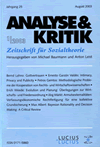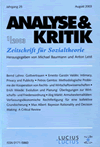Suchergebnisse
"John E. Roemer"
Titel: Thoughts on Arrangements of Property Rights in Productive Assets
Autor: John E. Roemer
Seite: 55-63
Abstract: State ownership, worker ownership, and household ownership are the three main forms in which productive assets (firms) can be held. I argue that worker ownership is not wise in economies with high capital-labor ratios, for it forces the worker to concentrate all her assets in one firm. I review the coupon economy that I proposed in 1994, and express reservations that it could work: greedy people would be able to circumvent its purpose of preventing the concentration of corporate wealth. Although extremely high corporate salaries are the norm today, I argue these are competitive and market determined, a consequence of the gargantuan size of firms. It would, however, be possible to tax such salaries at high rates, because the labor supply response would be small. The social-democratic model remains the best one, to date, for producing a relatively egalitarian outcome, and it relies on solidarity, redistribution, and private ownership of firms. Whether a solidaristic social ethos can develop without a conflagration, such as the second world war, which not only united populations in the war effort, but also wiped out substantial middle-class wealth in Europe thus engendering the post-war movement towards social insurance is an open question.
Titel: Comment on John E. Roemer
Autor: Martin Beckstein
Seite: 65-69
Egalitarian Political Economy beyond Market Socialism
Abstract: On reflecting about the prospects of advancing the egalitarian cause in the United States, John Roemer makes the case for more traditional strategies than the coupon socialism model he advocated in earlier work. First of all, he suggests, an ethos of solidarity must be developed and the super-rich be subjected to higher taxation. This comment assesses this proposal. On the one hand it is discussed whether the ethos of solidarity Roemer calls for in order to counteract the culture of greed among American elites requires nurturing an undesirable culture of envy among the rest of the population. On the other hand it is considered whether the neoclassical principal-agent model that Roemer believes must be contested in order to popularize a steep progressive income tax might be one of the more promising tools to restructure the incentives of economic elites and curb casino capitalism.
Titel: Thoughts on G. A. Cohen’s Final Testament
Autor: John E. Roemer
Seite: 97-112
I present briefly G. A. Cohen’s theory of distributive justice, discuss the relationship that I think he believed held between human nature and justice, and offer thoughts on the feasibility of Cohenesque justice, or Cohenesque socialism. I introduce the idea of Kantian equilibrium, as a way of explaining how people cooperate. Expanding the domain of activities in which humans cooperate will, I believe, go a long way towards achieving Cohenesque socialism, and the history of human society suggests it is feasible to do so.

Property-Owning Democracy
2013 (35) Heft 1
Guest-Editors: Francis Cheneval / Christoph Laszlo
Editorial
In recent years, ’property-owning democracy’ (POD), defined by widespread ownership of productive assets, has become one of the key-factors in the assessment of the institutional design implied in John Rawls’s theory of justice. The wider implications of this inquiry also engage scholars who do not subscribe to Rawls’s conception of justice but are broadly interested in normative questions of political economy and the basic structure of a just polity. In the course of this debate, the in...

The Normative Turn from Marxism
2015 (37) Heft 1
Editorial
Marxism, both as a Western political movement and an intellectual focus of dispute, lost its academic appeal during the 1970s and 80s, foreshadowing the collapse of `actually existing´ socialism in the early 90s. Within what after the Second World War was called `Western Marxism´, there had been growing awareness of Marx’s early philosophy with its suggestive, if somewhat vague, ideas of a universally productive life and an ideal productive society. In contrast, the stock of (not only offici...